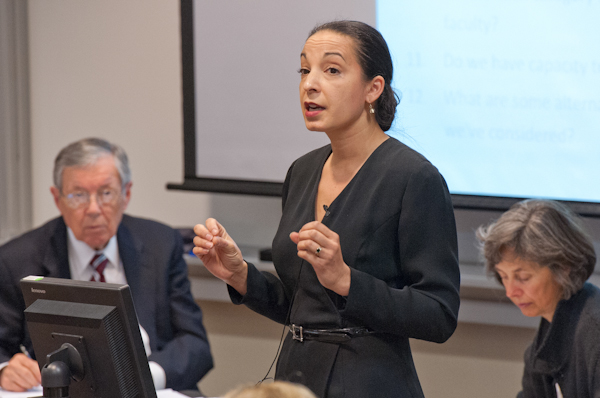The Faculty Senate discussed revisions to undergraduate breadth requirements at its Thursday meeting, with professors disagreeing over the number of courses a student should be required to take under the proposed new system.
Provost John Etchemendy Ph.D. ’82, currently acting president due to University President John Hennessy’s ongoing sabbatical, opened the meeting by emphasizing the success of Admit Weekend 2012.
Based on preliminary results from the Office of Undergraduate Admission, this year’s yield — the percentage of admitted students committed to Stanford — will be around 73.4 percent, an increase of approximately 3.4 percent from last year, Etchemendy said.
Etchemendy subsequently addressed the departure of Athletic Director Bob Bowlsby, who will leave Stanford at the end of the academic year to become commissioner of the Big 12 athletics conference. Etchemendy said that Bowlsby’s post will likely be filled on an interim basis while the University conducts a search for a permanent replacement.
“Bob has done a fantastic job here — and we’re very sorry to see him go — but this is an exciting opportunity for him,” Etchemendy said.
The Senate then heard a report by the Committee on Undergraduate Standards and Policy (C-USP) on proposed revisions to academic breadth requirements. C-USP chair Judith Goldstein delivered the report.
Goldstein critiqued the existing breadth requirements, which total 12 courses, including the Introduction to the Humanities (IHUM) program and the Program in Writing and Rhetoric (PWR). In particular, she highlighted students’ current ability to double count courses between the “Disciplinary Breadth” and the “Education for Citizenship” General Education Requirements (GERs).
“This has created an odd and, at times, insidious incentive for students to get around our breadth requirements,” Goldstein said.
The original Study of Undergraduate Education at Stanford (SUES) report, which was first delivered to the Faculty Senate at the end of January, recommended the implementation of seven new interdisciplinary breadth requirements based on skills that were deemed essential to students: aesthetic and interpretive inquiry, social inquiry, scientific analysis, formal and quantitative reasoning, engaging difference, moral and ethical reasoning and creative expression.
Under this proposal, students would be obligated to take two courses in four of the breadth areas and one course in each of the remaining three.
The C-USP report, however, chose to abandon the double requirements in all but one breadth requirement.
Goldstein expressed a desire to emphasize student choice within the new system and said she is concerned that weighting some requirements more heavily might distort the undergraduate academic experience.
“We don’t have to worry that our students aren’t being broadly educated,” Goldstein said, citing statistics demonstrating the breadth of study pursued by non-humanities majors even as upperclassmen.
Mechanical Engineering Professor Chris Edwards and Economics Professor Caroline Hoxby proposed an amendment to the C-USP proposal to return to the SUES report’s recommendations for differently weighted requirements.
“There is a reason for having more than one [course per requirement], and it has to do with the choice we can offer students,” Edwards said.
“We want students to be thoughtful about the choices they’re making and for them to be able to choose two courses that work together to satisfy the learning goals in this area,” Hoxby added.
Edwards, who served as the chair of the SUES subcommittee on breadth, argued that the SUES report aimed to spread requirements across the undergraduate experience and engage students to a greater extent, rather than reduce overall requirements.
“We want breadth to complement the major,” Edwards said. “It’s about being smart, and it’s about being intentional.”
Edwards emphasized the relatively light nature of current undergraduate academic requirements at Stanford by comparing overall course load to peer institutions such as Yale, Harvard and Princeton. After adjusting other universities’ requirements to accommodate the quarter system, Stanford’s requirements remain significantly less onerous, he said.
“We’re allowing more freedom than any of our other peer institutions,” Hoxby said. “Because our system isn’t departmentally based, it also allows more flexibility.”
Faculty discussion of the C-USP proposal, and of the amendment, revolved around the impact of revised requirements on the University’s reputation, as well as on undergraduate students.
“Outside perceptions of Stanford are important,” said Richard Saller, dean of the School of Humanities and Sciences. “I worry that the C-USP amendment will only contribute to the reputation that Stanford has [of being mostly science-oriented].”
Joseph Lipsick, professor of pathology, expressed concern that the amendment’s restoration of more extensive requirements may prompt resentment among undergraduates.
“There are certain things we need for a liberal education and certain things we want for our students as they exit Stanford,” countered Vice Provost for Undergraduate Education Harry Elam. “If we limit [the requirements], are we fulfilling all the things we want them to be as they enter the world?”
“The notion that we’ve dramatically extended the footprint [of requirements] is not correct,” said James Campbell, co-chair of the SUES committee. “I’d be reluctant to see it shrunk further.”
Dan DeLong ’13, ASSU Undergraduate Senate representative, expressed the importance of soliciting student feedback on the various proposals.
“The success of either proposal largely hinges on how Vice Provost Elam and his office are able to create a program that allows students to easily identify courses they want to engage in,” DeLong said.
The Senate will return to the subject at its next meeting on May 17.
